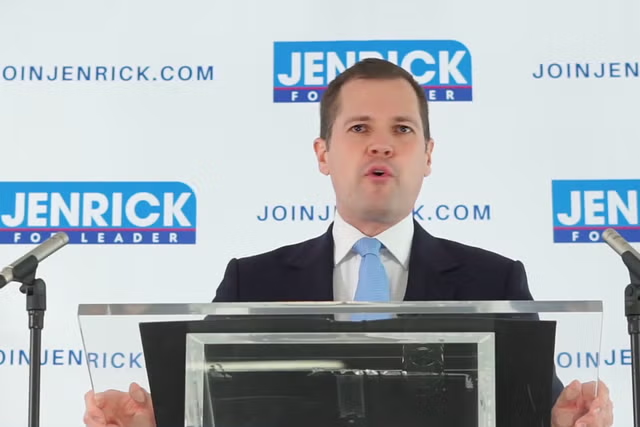Your support helps us to tell the story
Support NowThis election is still a dead heat, according to most polls. In a fight with such wafer-thin margins, we need reporters on the ground talking to the people Trump and Harris are courting. Your support allows us to keep sending journalists to the story.
The Independent is trusted by 27 million Americans from across the entire political spectrum every month. Unlike many other quality news outlets, we choose not to lock you out of our reporting and analysis with paywalls. But quality journalism must still be paid for.
Help us keep bring these critical stories to light. Your support makes all the difference.
So cautious and moderate was former immigration minister Robert Jenrick when he entered the Commons that he was nicknamed “Robert Generic”.
Yet now 10 years later, he has reached the final two of the 2024 Conservative Party leadership campaign in a battle against Kemi Badenoch to become the champion of the Tory hard-right - but it all was very different when he was first elected.
He ticked every box of the Conservative cliche. A history graduate from Cambridge and a qualified solicitor, he joined parliament as the MP for Newark in 2014. He voted to remain in the EU, and backed Theresa May’s Brexit deal three times. He has served as a minister, in multiple departments, under every prime minister since 2017. It is no surprise that he has long been considered a moderate within the party.

As a long-standing friend of Rishi Sunak, Mr Jenrick seemed like the obvious choice to keep a watchful eye over the unpredictable home secretary Suella Braverman.
Sunak may have hoped that the teddy bear-like Mr Jenrick would keep the wild bear Ms Braverman under control – instead, after 13 months, he joined her. Now he is battling it out with fellow right-winger Ms Badenoch to succeed Mr Sunak after the Tories’ worst general election defeat in history.
It was with great stealth that Mr Jenrick crept up the list of possible leadership contenders. Despite serving in a number of high-profile departments, spanning the Treasury, health, the Home Office and housing, the former minister’s name never entered conversations about leadership until the run-up to the election. But those who have worked with him are complimentary, describing him as “deeply cerebral” and a skilled communicator, and say his political vision extends far beyond immigration.
Housing is a high priority for Mr Jenrick. Having brought forward proposed planning reforms as housing minister, and issued a plea to his successor, Michael Gove, not to water down housebuilding commitments, he breaks with some within the party who have opposed housing targets. Mr Jenrick has warned that the party will alienate young voters if it doesn’t make good on its housing pledges. With the Tories in fifth place among the under-35s, Conservative strategists say a pro-housebuilding stance could be the only way to avoid a wipeout.
But despite his seemingly centrist credentials, allies insist Mr Jenrick has always been of the right. One observer says it is the Conservative Party that has moved further left, citing David Cameron’s 2010 manifesto commitment to reduce net migration to “tens of thousands a year” – which is considerably less than the current net migration figures, which stand at 672,000 for 2023.
Though often seen as the more moderate force in the Home Office, Mr Jenrick seized headlines by ordering murals of Mickey Mouse and Baloo from The Jungle Book to be removed from the walls of an immigration detention centre because they were too welcoming. Ms Braverman and Mr Jenrick have a long-standing friendship, having studied together at Cambridge University and worked closely together in the Home Office, and they remained aligned on amendments to Sunak’s Rwanda legislation.

The Westminster rumour mill went into overdrive about his ambitions after Mr Jenrick’s sudden weight loss and new haircut earlier this year. He has since said his weight loss was down to better diet and exercise, having tried the weight loss drug Ozempic and not enjoyed it.
There is no denying that he has looked – and sounded – hungry for months, spearheading rebel amendments against Mr Sunak’s Rwanda bill and holding the pen on Daily Telegraph op-eds that were openly critical of the Tory government’s position. “In almost everyone’s eyes, he’s grown in stature,” said a senior Conservative MP and close friend of Mr Jenrick, John Hayes shortly before he launched his leadership bid.
But his record is not flawless. Back in 2020, he was involved in a cronyism scandal when he overruled a planning decision to the benefit of newspaper magnate Richard Desmond, who then donated £12,000 to the party.
As housing minister, he was accused by some of his colleagues of “concreting over” their constituencies in his push to build more rural homes.
Mr Jenrick is also married to Michal Berkner, a wealthy lawyer. If the Conservatives wanted to choose a leader who represents a break from the last few decades, picking another Oxbridge alumnus with millions in the bank would not be wise.

Mr Jenrick and Ms Badenoch’s position in the final two confirms what many more centrist Tories feared, that the party would lurch to the right after an electoral rout. Especially as the party needs to win back Tory voters lost to Nigel Farage’s Reform.
They worry that Mr Farage’s brand of brash populism could frighten away voters.
But, with Ms Badenoch’s abrasive reputation, Mr Jenrick undeniably feels the more moderate choice of the final two. How much more safe and sensible to pick someone like Mr Jenrick, who holds similar views but seems much less scary. After all, who would be frightened by a teddy bear in a suit?
Disclaimer: The copyright of this article belongs to the original author. Reposting this article is solely for the purpose of information dissemination and does not constitute any investment advice. If there is any infringement, please contact us immediately. We will make corrections or deletions as necessary. Thank you.



